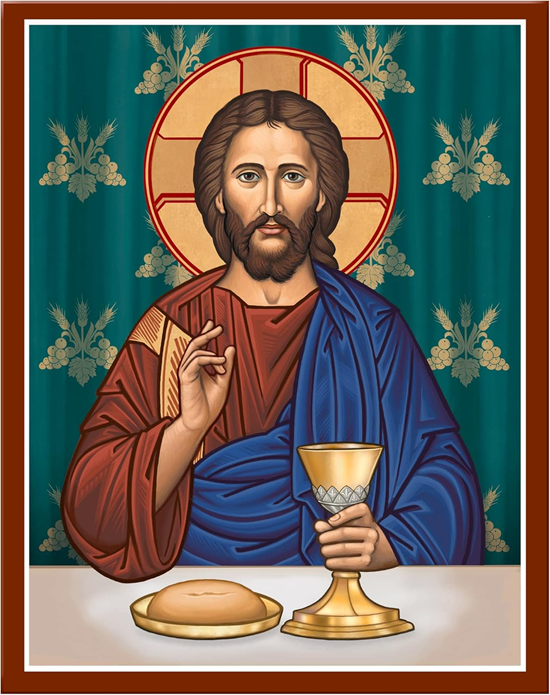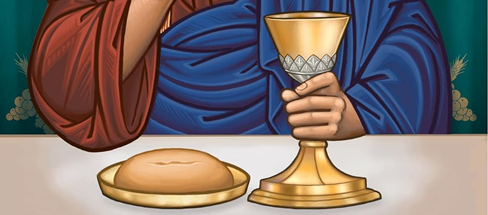Transforming the Flesh
Twentieth Sunday Scripture Readings

When meditating on the gospels that form the bedrock of our understanding of God and the universe, I think it’s important that we dig deeply into the gospel texts. Only in this way can we hope to grasp the nuances of the witness testimony that’s being presented to us. Today’s gospel passage demands our attention because it touches on the core beliefs of our Christian faith. This passage stands out because it’s clearly a Eucharistic or sacramental text. Because of this, some Scripture scholars think the passage is out of place in the gospel and assume it was a later addition from the first-century Christian Church. However, it’s clearly in context and serves as John’s only homage to Christ’s institution of the Eucharist.
Although this passage is very familiar to us and a great deal has been said about it over the centuries, the deeper we dive into it, the more is revealed to us. Our liturgy speaks of the “body and blood” of Christ, but here, John uses a phrase that has deep roots in the Hebrew Scriptures. The word he uses here is quite specific: flesh. In Hebrew, the word is בָשָׂר (baśar), which means, quite literally, meat. Figuratively, it refers in a general way to the human condition—our being creatures of flesh and blood. For the Hebrew people, there was no dichotomy between the “body” and the “soul.” Their anthropology didn’t look at human beings as a “ghost in a machine.” So, the flesh didn’t carry with it the negative connotations that subsequent theologians have given it. Instead, the world of the flesh for the Hebrews was the world of generation and heredity, the world of human interaction and affairs, the world of human knowledge and understanding. It’s what we would call the “secular” world. It was not in itself sinful. On a different plane was the world of God and the spirits. It was the world that humanity aspired to connect with.
For the Jews of the diaspora—those living apart from Jerusalem and Judea—the Hebrew language was often foreign. That’s why, very early on, around the second century BC, the Hebrew Scriptures were translated into Greek, the language of the people. Two of the words that were used in Greek to translate the Hebrew בָשָׂר (baśar) were σαρξ (sarx), meaning “flesh,” and σωμα (sōma), meaning “body.” When Jesus spoke, and when John wrote, they did not adopt the Greek philosophers’ distinctions between “body” and “soul,” nor did they think in Medieval terms of “soul, good; body, evil.” Instead, for Saint John and the other early Christians, the world of the σαρξ (sarx), the world of the “flesh” was the world of the human condition. It could never, under its own power, access the world of the spirit, which is the world of intimate relationships with God. Humans can’t think their way to belief. There is no intellectual “proof” which, on its own, can take us into intimate relationship with the Father. The initiative must come from the Father to span that unbridgeable chasm.
John, at the very outset of his gospel, tells us how the Father bridged that gap. He tells us that the eternal Word of the Father that created all things became flesh—σαρξ (sarx)—and pitched his tent among us. He’s saying much more than simply the Word of the Father took on a human body. That’s his σωμα (sōma). No, the Word became flesh, that is σαρξ (sarx), and came to share in our human condition. It’s God’s sharing in our humanity that joins forever that world with the world of the Spirit. Thus, God made spirituality possible, allowing us to see beyond ourselves and, therefore, to live not just for ourselves but for God and for one another.
To repeat, for Jesus and for John, the world of the flesh—the σαρξ (sarx)—is not an evil world, only a frustratingly incomplete and therefore an unhappy one because, ultimately, nothing in that world has any lasting meaning. Everything in it is subject to decay. It’s the world of impermanence, the world of illusion, the world of what the Buddhists call “Maya.” We’re observing it at play in our world right now. There are two irreconcilable movements afoot: one will use any means and stop at nothing to win wealth, power, and prestige for themselves. The other works to better the lives of others unconditionally.
So here is Jesus, offering us his flesh to be consumed. His is a flesh—a human condition—infused with the eternal Word. Flesh that brings with it irrepressible, indomitable, indestructible life. As we hear in our fourth Eucharistic prayer, “In fulfillment of your will he gave himself up to death; but by rising from the dead, he destroyed death and restored life. And that we might live no longer for ourselves but for him, he sent his Holy Spirit from you, Father, as his first gift to those who believe …”
And here we are today at this Eucharist, celebrating that the Father sent us his eternal Word of life and took on our flesh—our human condition—to transform it into his own life and give it back to us so that the impermanence of our world might be replaced by the permanence of his life and love. “Just as the living Father sent me and I have life because of the Father, so also the one who feeds on me will have life because of me.” How do we feed on the bread of life? We do so by living selflessly as he lived, loving unconditionally as he loved, living in communion with our heavenly Father as he did through prayer and meditation, and by joining with him and all who believe in receiving this sacrament, this living sign of the bread of life and the cup of eternal salvation.
Get articles from H. Les Brown delivered to your email inbox.
